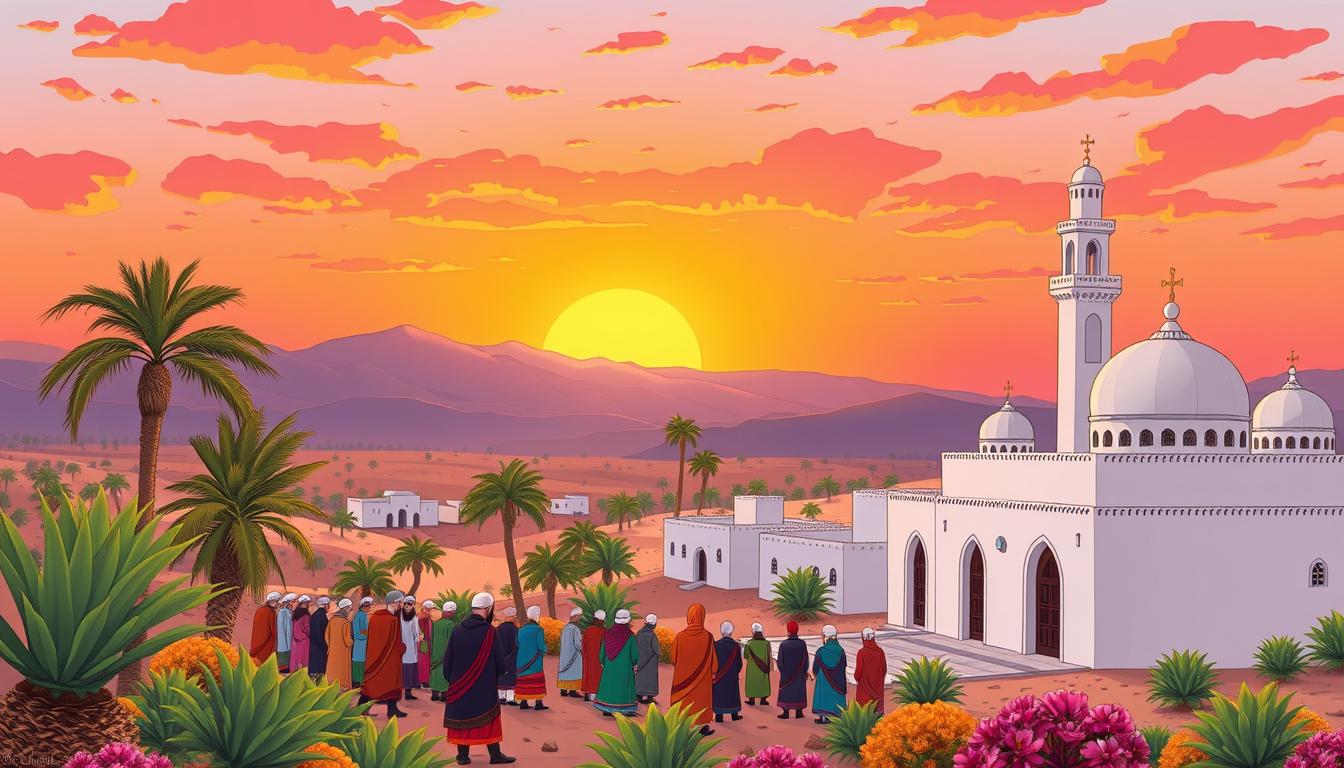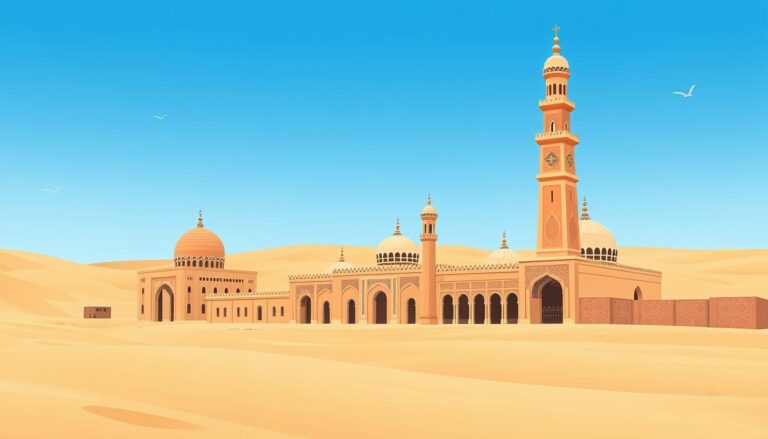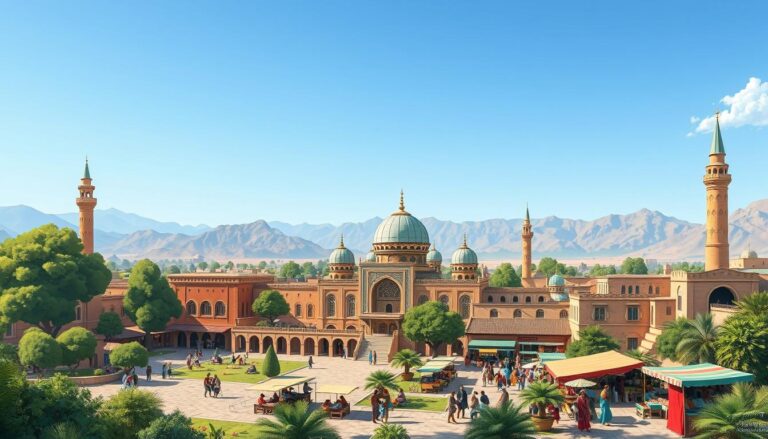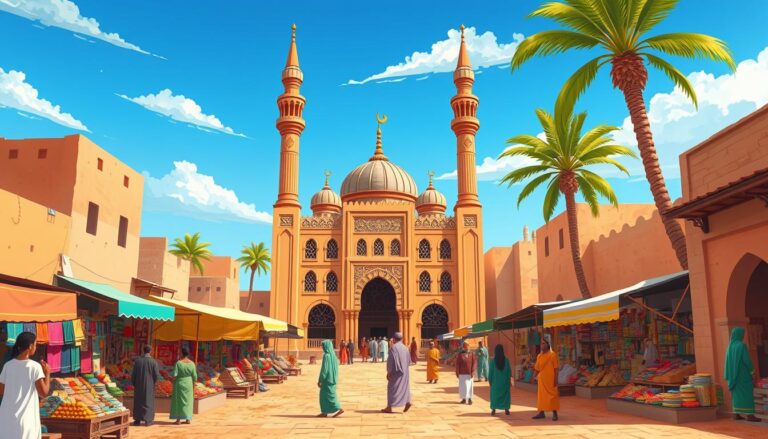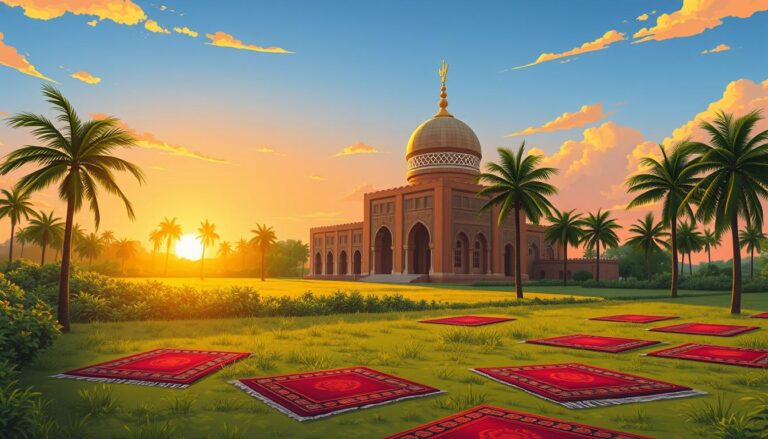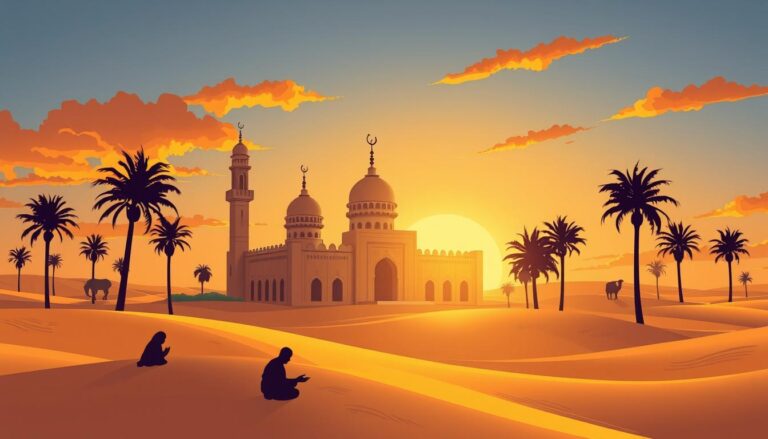Islam in Algeria
Islam is the main religion in Algeria, with most people following Sunni Islam. They follow the Maliki school of jurisprudence. A small group in the M’zab Valley practices Ibadi Islam.
Statistics show that 99.1% of Algerians are Sunni Muslims. The rest are Christians, Baháʼís, and Jews. The constitution makes Islam the state religion. The government controls religious activities to keep its power.
Islam came to Algeria in the 7th century. It took until the 15th century for the conversion to finish. Sufism and Maraboutism have shaped Algerian Islamic traditions and practices.
Introduction to Islam in Algeria
Islam is deeply rooted in Algerian society, touching almost every part of life. The Islamic Influence in Algeria is clear, with 99% of people following Sunni Islam. This faith is not just a religion but also the heart of Algerian culture and values.
The Algerian constitution makes Islam the official state religion. This shows the Role of Islam Algerian Society. The government must protect places of worship from political or ideological interference. This highlights Islam’s importance in the country.
“Islam pervades most aspects of life in Algeria and provides the society with its central social and cultural identity, giving most individuals their basic ethical beliefs.”
Islam’s strong presence in Algeria shows its lasting impact on the North African nation. From its early days to its role today, Islam’s story in Algeria is deeply connected to the country’s history, present, and future.
Historical Arrival of Islam
The history of Islam in Algeria began in the 7th century. It was introduced by the Umayyad dynasty after they invaded. This conquest and conversion took place from 670 to 711 AD.
The native Berber people quickly adopted Islam. However, some Christian and pagan groups remained until the Almoravid era.
Early Spread of Islam in North Africa
By the late 8th century, Algeria was ruled by the Rustamids. They followed the Ibadhi sect of Islam. But, the Fatimids’ Ismaili doctrine was not widely accepted in North Africa.
It wasn’t until the Almohads arrived that Sunni Islam became widespread in Algeria. The Maliki madhhab became common, except in the M’zab region and among small Jewish communities.
Influence of Sufism and Maraboutism
The cult of holy men, or maraboutism, was a key part of Islam in North Africa. It originated from the traditional Berber religion. Sufism, the mystical branch of Islam, also shaped Algeria’s religious landscape.
“The Tijaniyya Sufi order in Algeria became allies of French conquest and expansion.”
Islam in Modern Algeria
Role of Islam During French Colonization
The French arrived in Algeria and started to weaken the Muslim culture. This move made Islam a key part of the fight for freedom. The fighters were called moudjahidine, and those who died were honored as chouhada, even though they fought for socialism.
The French idea of freedom of religion was very different from Islam. The discrimination against Islam made it even more important in the fight for freedom. It became a symbol of Algerians’ desire to keep their culture and gain independence.
“Islam became a rallying cry for Algerians seeking to reclaim their cultural identity and independence from the colonial power.”
The Islamic Resistance was crucial in the fight for Algerian independence. The Role of Islam in Colonial Algeria was a major force in the people’s quest for freedom.
The civil war in Algeria from 1991-2002 was very damaging. It made many Algerians wary of radical politics and Islamist movements. After the war, people preferred the government to control religious matters, not the public.
Post-Independence Islamic Reforms
After Algeria became independent in 1962, the government took control over religious activities. Islam was made the state’s religion, and the government built mosques and managed religious property. But, this didn’t please everyone, and a group called Al Qiyam started in 1964. This group led to the rise of the Islamic Salvation Front (FIS) in the 1990s.
The Algerian Government Policies Islam aimed to use Islam for national unity and control. The state wanted to keep radical Islamists out and promote a moderate Islam. But, this plan failed in the 1980s. The government’s tolerance towards Islamists campaigning against foreign ways caused violent student clashes in Algiers in 1982.
The Islamist Movements in Algeria grew stronger after that. The Islamic Salvation Front (FIS) was formed in 1989. The FIS wanted Islam to play a bigger role in Algeria’s laws and politics. This was a big challenge to the secular Islamic Reforms Post-Independence Algeria the government was pushing for.
“More than 100,000 people died during the civil war in Algeria that spanned the decade following the military coup against Islamist political leaders in 1992.”
The fight between the government and Islamist groups had a big impact on Algeria. It changed the country’s religious and political scene. This fight shaped the complex relationship between the state and Islamic Reforms Post-Independence Algeria for years to come.
Islam and the Algerian State
The bond between Islam and the Algerian government is complex and key to the country’s politics. After gaining freedom, the Algerian state took charge of religious matters. It made Islam the official religion in the new constitution.
The government controlled mosque building, imam appointments, and religious property management. This move aimed to unite the country under one Islamic identity. It was a way for the state to keep control and ensure unity.
The constitution also set up a High Islamic Council. This council was to encourage ijtihad and offer opinions on religious matters. This shows the government’s effort to shape religious views and guide Islamic teachings.
“The Algerian government asserted state control over religious activities after independence for purposes of national consolidation and political control.”
Islam plays a big role in Algerian politics. The government uses its religious policies to stay in power and be seen as legitimate. This creates a delicate balance between the state’s Islamic values and its political control.
However, there have been issues and debates, especially about registering religious groups and treating minority faiths. The Algerian government’s religious policies are a big part of its governance. They show how deeply Islam affects the country’s politics and society.
Sunni Islam in Algeria
Sunni Islam is the main branch of Islam in Algeria. It makes up over 99% of the Muslim population. Sunni Muslims in Algeria mainly follow the Maliki school of Islamic jurisprudence.
This school, based on Malik ibn Anas’ teachings, has greatly influenced Algeria’s culture and religion.
The spread of Sunni Islam in Algeria started with the faith’s arrival in North Africa. Over time, the Maliki school became a big part of Algerian society. It shapes the country’s Islamic Jurisprudence and religious practices today.
Today, Sunni Islam is at the heart of Algerian religious identity. Most Algerians follow its teachings and traditions.
Even though Sunni Islam is the main faith, Algeria also has other religious groups. These include Ibadi Muslims, Christians, and Jews. But these groups make up less than 1% of the population.
The Algerian government supports religious freedom, as stated in the constitution. But, some religious groups face challenges and restrictions.
In summary, Sunni Islam and the Maliki school are key to Algeria’s identity. They shape the country’s culture, society, and politics. While other religious minorities exist, most Algerians follow Sunni Islam.
Sufi Orders in Algeria
Sufism, a mystical part of Islam, has been key in Algerian life for over 1,400 years. The Sufi orders, or turuq, have greatly influenced Algeria’s culture and society. Each order has its own path, rituals, and symbols, led by important marabouts and shaykhs.
Prominent Sufi Orders
Algeria is home to many Sufi orders, like the Alawiyya, Chabiyya, and Qadiriyya. The Rahmaniyya order is especially influential in the country. These orders have deeply touched both city and countryside lives.
In Algeria, Sufis often practice dhikr and wird. They also celebrate Ashura, Mawlid, and Sebiba. These rituals are important to them.
Sufism has been a strong moral and social force in Algeria. Sufi leaders have fought against colonialism and authoritarian rule. The government sees Sufism as a way to fight extremism and keep society stable.
Sufism’s impact in Algeria is deep and ongoing. It has shaped the country’s religious, cultural, and social scenes. From early Islam to today, Sufi orders have promoted peace and community, offering a special Islamic spirituality.
Minority Islamic Groups
In Algeria, most Muslims follow Sunni Islam, specifically the Maliki school. But, the country is home to a diverse religious scene. A small but lively Ibadi Muslim minority lives mainly in the M’zab Valley. There are also a few Shia Muslims and other Islamic minorities.
The Ibadi Muslims have a long history in the M’zab Valley, dating back to the 11th century. They have kept their own culture and faith alive, living alongside the Sunni majority.
Shia Muslims make up a tiny minority in Algeria, with numbers in the hundreds or low thousands. They sometimes face challenges in practicing their faith. This is because the Algerian state mainly supports Sunni Islam.
Algeria is not just about Islam. There are also small groups of Christians, Baháʼís, and a few Jews. But, these minorities often face restrictions and challenges in practicing their faith.
Even though Sunni Islam is the main religion in Algeria, the country’s minority groups add to its rich culture and faith. This includes the Ibadis, Shias, and other religious minorities.
Islam in Algeria
Islam is a big part of Algerian life, touching many areas of society. It is the main social and cultural identity for most people. Over 99% of Algeria’s 43 million people are Sunni Muslims, mostly following the Maliki school.
The Algerian constitution says Islam is the state religion. The government makes sure places of worship are safe from political or ideological influence. This strong Islamic presence has greatly influenced Islamic Influence Algerian Society and Role of Islam Algerian Culture. Islamic Practices in Algeria are a big part of daily life for many.
“Islam pervades most aspects of life in Algeria and provides the society with its central social and cultural identity, giving most individuals their basic ethical beliefs.”
While Sunni Islam of the Maliki school is the main religion, there are also religious minorities. Christians make up less than 1% of the population. These minority groups face challenges in practicing their faith freely because of the strong Islamic influence.
The role of Islam in Algerian culture and politics is a topic of debate. Islamic movements and organizations have shaped the political scene. Islamist parties aim to gain power through elections. Yet, the Algerian government tries to balance the country’s Islamic identity with preventing extremist ideologies that could harm social stability.
Non-Muslim Minorities in Algeria
Islam is the main religion in Algeria, with over 98% of the people following it. However, the country also has a variety of religious minorities. The Christian Population Algeria and Jewish Community Algeria make up less than 1% of the population.
The Christian groups in Algeria include Roman Catholics, Protestants, Lutherans, Anglicans, and about 1,000 Egyptian Coptic Christians. Religious leaders’ unofficial estimates suggest the number of Christians in Algeria ranges from 20,000 to 200,000. Most Christians in Algeria are foreign residents and immigrants.
The Jewish community in Algeria is estimated to be fewer than 200 people. This Religious Minorities in Algeria has faced legal and social discrimination.
“Since November 2017, 17 churches belonging to the Protestant Church of Algeria have been closed by Algerian authorities due to a lack of authorization from the National Commission for the exercise of non-Muslim worship.”
Other than Christians and Jews, Religious Minorities in Algeria include Ahmadi Muslims, Shia Muslims, and a community of Ibadi Muslims. These groups have faced persecution and legal barriers to practicing their faith freely.
The Algerian government’s handling of Religious Minorities in Algeria has been controversial. There are concerns about the registration requirements and the closure of non-Muslim places of worship. As Algeria deals with religious diversity, the rights and freedoms of these minority communities are crucial to address.
Challenges and Controversies
Algeria’s laws say Islam is the state religion, but there are many issues with religious freedom. The government’s rules on registering religious groups are a big problem. This affects how minority faiths are treated.
The Algerian government makes all groups, including religious ones, register as associations. Challenges to Religious Freedom Algeria and Registration of Religious Groups Algeria are major concerns. Many minority religious groups find it hard to get their registration approved.
Registration of Religious Groups
The Government Policies Towards Minority Faiths in Algeria have been questioned, especially the registration process. The Ahmadi Muslim community and the Protestant Church of Algeria (EPA) have tried to register since 2012. But, the government still hasn’t accepted their applications.
- Unregistered associations can’t own property, open bank accounts, hold gatherings, or collect funds.
- Members of unregistered groups might face criminal charges.
This makes it hard for minority religious groups to practice their faiths openly in Algeria. The government’s policies have sparked a lot of controversy and worry among those who support religious freedom.
“The government’s policies regarding the registration of religious groups have created significant obstacles for minority faiths in Algeria to practice their beliefs freely.”
Conclusion
Islam is deeply rooted in Algerian society, being the main and state religion. Most Algerians follow Sunni Islam, specifically the Maliki school. This makes Islam the core of their social and cultural identity.
The government tries to control religious activities, but this has sparked militant Islamic movements. They want Islam to play a bigger role in the country’s laws and politics.
Algeria also has minorities like Ibadi Muslims, Christians, Jews, and others. They face hurdles in registering their groups and practicing their faiths. The tension between the government and these groups shapes Algeria’s religious scene.
Despite these obstacles, Islam’s importance in Algerian society remains strong. It influences the country’s culture, society, and politics. As Algeria moves forward, Islam’s role in shaping its future will be key in the ongoing discussions about its religious landscape.
Source Links
- Islam in Algeria
- Religion in Algeria
- The Rising Threat of Revolutionary Islam in Algeria
- The Shifting Foundations of Political Islam in Algeria
- Project MUSE –
- Algeria – Culture, Traditions, Cuisine
- Political Islam in Post-Conflict Algeria
- A History of Islamist Movements in Algeria – TeachMideast
- Algeria: Bloody Past and Fractious Factions
- Factsheet: Law and Religion in Algeria
- Studia politica 1 2016
- Algeria – United States Department of State
- International Center for Law and Religion Studies
- Algeria – United States Department of State
- Religious Beliefs In Algeria
- Sufism in Algeria
- Book NOW Islamic 3 2 13204.indb
- Algeria – Minority Rights Group
- Algeria: Release members of Ahmadi religious minority
- Algeria: Stop Persecuting a Religious Minority
- Algeria – United States Department of State
- In Algeria, an Islamist Threat Still Looms over Domestic Politics
- Islam and the State in Algeria and Morocco: A Dialectical Model
- Freedom of religion in Algeria
- Algeria | Middle East Concern
- Algeria: Drop all charges against members of a religious minority
- The Islamist Challenge in Algeria
- Invisibility and Negrophobia in Algeria
- Muslim Brotherhood in Algeria
- No title found

